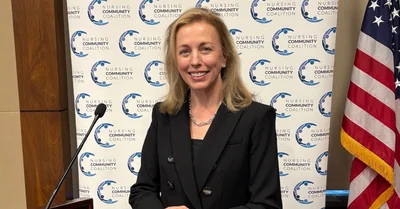U.S. Rep. Chris Smith (R-NJ) recently spoke on the floor of the House about China, saying both the American business and political communities are becoming too tolerant of the communist state's human rights abuses.
In a video posted Jan. 10 on his YouTube channel, Smith argued that it was once believed that accepting China as a member of the World Trade Organization (WTO) would be the key to China becoming more democratic, but he said the Chinese Communist Party (CCP) has only gotten worse. In the meantime, the U.S. has just stood by and watched.
"Twenty years ago, when China became a member of the World Trade Organization, most members of Congress -- and certainly in the business community and foreign policy establishment -- bought into what James Mann rightfully called ‘the China Fantasy.’ In other words, if you just trade more with a dictatorship, somehow they’ll matriculate into a democracy," Smith said in the video. "That fantasy has been shown to have been demonstrably naive, at best."
He referred to problems such as the forced detention and killings of Uyghur Muslims and the harassment of Chinese nationals in the U.S. as examples of recent abuses, adding that over his long career in Congress, he has chaired 76 congressional hearings on China, written several pieces of legislation and served as Republican sponsor of Jim McGovern’s Uyghur Forced Labor Prevention Act. Smith added that Congress must act to make sure those laws are being faithfully implemented.
"For over three decades post-Tiananmen Square Massacre, Congress was deeply divided, not between Republican and Democrat, but among the majority here and in the Senate who favored unfettered engagement and trade without serious human rights conditionality," Smith said in the speech. "Indeed, President Clinton de-linked human rights and trade on May 26, 1994. I went up there and gave a press conference saying how serious that was to give up on human rights and allow profits to trump human rights."
This process has continued from the 1989 incident in Tiananmen Square until now, Smith said, adding that "as predicted, we have become more like them, and thankfully that is changing, but many in our corporate establishment ... were standing right by Beijing and the CCP and Xi Jinping and wouldn’t utter a word... about the terrible killing of the Uyghurs and the use of forced labor camps."
The Australian Strategic Policy Institute reported that the Chinese government was complicit in the use of Uyghurs and other ethnic minorities as forced labor in factories across China. More than 80,000 people from such ethnic groups have been forcibly removed from the Xinjiang Province against their will to work in factories. Workers are also forced to live in segregated dorms, put through ideology training in their off-hours, kept under constant surveillance and are unable to practice any religion.
Among the companies known to have benefited from this labor are: Apple, BMW, Gap, Huawei, Nike, Samsung, Sony and Volkswagen, according to the Australian Strategic Policy Institute.
In addition, Smith said U.S. leaders "have stood by as the Chinese embassy, and the Ministry of State Security officials have harassed people of Chinese heritage and nationality living lawfully in the United States."
A report from the America First Policy Institute stated that CCP-funded campus initiatives allow China to use American college and university student organizations, like Confucius Institutes, to spy on Chinese dissidents within student populations, which undermines national security, Smith explained.
In a recent House vote, lawmakers voted 365-65 to create a House Select Committee on China, Politico reported. U.S. Rep. Mike Gallagher (R-WI) will be chairman of the committee, although no other members have been named. The committee will focus on short-term military readiness in East Asia and long-term economic competition posed by China, the report said.
"I want to applaud our Speaker for pushing hard for this Select Committee (on China), and hopefully it will make a difference,” Smith said in his speech.









